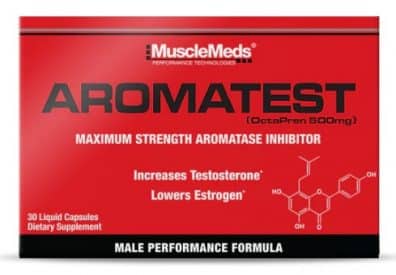Can estrogen blockers burn body fat?
Obesity is a rising issue in this country, and when it comes to burning off that unwanted body fat and combating obesity, it is not often that you will think of estrogen blockers as tools to do so. However, obesity is a multifactorial condition influenced by various factors, including genetics, lifestyle, and hormone levels.
One hormone that has gained significant attention in obesity research is estrogen, primarily known for its role in reproductive health. However, studies have shown that estrogen levels can also impact body weight, fat distribution, and metabolism, making it an important factor to consider in the fight against obesity, which is why aromatase inhibitors may be good to combat obesity.
Usually, you turn to standard over the counter fat burning products and increasing the amount of cardio that you do, as well as dietary restrictions. But unfortunately, many times it is not this simple. Typical fat burning products may not be addressing the root cause of your weight gain. Recent research has found that there is a direct correlation between male obesity and high estrogen. This is where aromatase inhibitors can be used to fight obesity.
Let’s break it down.
Understanding the Link Between Estrogen and Obesity
Estrogen is a sex hormone primarily found in women, but it happens to play a significant role in obesity and body weight regulation in men. High estrogen levels have been associated with weight gain, insulin resistance, and cardiovascular disease risk factors. Estrogen levels also influence fat distribution, with excess estrogen leading to increased visceral fat, which is particularly harmful to health.
Obesity, on the other hand, can disrupt estrogen production and balance, further exacerbating weight gain. Research suggests that estrogen levels may influence energy balance and metabolism, making it an important factor to consider in obesity prevention and treatment.
The Role of Adipose Tissue in Obesity
Adipose tissue, commonly known as body fat, plays a significant role in obesity. It is not just a passive energy storage organ but also an active endocrine organ, producing hormones and adipokines that influence metabolism, energy balance, and body weight regulation.
Excess adipose tissue, especially visceral fat, is associated with various health risks, including diabetes, cardiovascular disease, and metabolic syndrome. The distribution of adipose tissue, such as subcutaneous fat, can impact body mass index (BMI) and body fat distribution.
Understanding adipose tissue function is crucial for addressing obesity and its related health issues. By targeting adipose tissue metabolism, we can potentially develop strategies to promote weight loss and metabolic health.
What are Aromatase Inhibitors?
Aromatase inhibitors are medications that reduce estrogen production in the body by blocking the enzyme aromatase, which converts hormones, such as testosterone, into estrogen. These inhibitors are we first discovered and commonly used in hormone receptor-positive breast cancer treatment, where estrogen production fuels cancer growth. However, researchers have found other medical uses for them in men to help enhance testosterone and reduce estrogen levels. More recently researchers have been examining their potential role in obesity treatment has also been explored.
Researchers have found that by inhibiting aromatase, these medications disrupt the hormone balance that contributes to obesity. By reducing estrogen levels, aromatase inhibitors may have therapeutic effects on weight loss and metabolic health, making them an interesting avenue of research in obesity management.
The Function of Aromatase in the Body
Aromatase is an enzyme primarily found in adipose tissue that converts androgens, such as testosterone, into estrogen. It plays a significant role in hormone balance, menstrual cycle regulation, and various metabolic processes.
The activity of aromatase can influence fat mass, body weight, and fat distribution. By targeting aromatase, we can potentially impact estrogen levels, which, in turn, affect energy metabolism, fat metabolism, and body fat distribution. Understanding how aromatase functions is essential for developing strategies to target obesity effectively.
Aromatase Inhibitors and Obesity
The role of aromatase inhibitors in obesity management lies in their ability to lower estrogen levels, which can have significant implications for weight loss and metabolic health. By inhibiting aromatase, these medications disrupt estrogen production, leading to lower estrogen levels in adipose tissue.
How Aromatase Inhibitors Influence Fat Metabolism
Aromatase inhibitors affect fat metabolism by reducing estrogen levels in adipose tissue. Lower estrogen levels can promote fat loss by increasing energy expenditure allowing you to burn more calories. If can also help improve insulin sensitivity, all of which are important factors in obesity management and the prevention of cardio vascular disease and diabetes.
The Impact of Aromatase Inhibitors on Appetite and Satiety
Appetite and satiety, important factors in weight regulation, can be influenced by estrogen levels. Aromatase inhibitors, by reducing estrogen levels, may impact hormones involved in hunger, such as leptin and ghrelin.
Lower estrogen levels due to aromatase inhibitors may help individuals feel more satisfied with smaller food portions, potentially contributing to weight loss efforts and obesity management. Understanding the impact of aromatase inhibitors on appetite can guide personalized obesity treatment.
Can Aromatase Inhibitors Regulate Energy?
Aromatase inhibitors have the potential to regulate energy balance and expenditure, making them an interesting avenue of research in obesity management. Lower estrogen levels, achieved with these inhibitors, can increase energy expenditure, potentially leading to weight loss.
By targeting estrogen production, aromatase inhibitors may influence energy metabolism, leading to weight loss and fat reduction. These medications have been studied for their role in improving energy balance in obese individuals, providing hope for more effective obesity treatment options.
They affect various metabolic processes, including energy expenditure and fat metabolism. Estrogens also influence adipose tissue distribution, insulin sensitivity, and body fat distribution. Understanding how estrogens regulate energy balance is crucial in addressing obesity effectively. By targeting estrogen metabolism, specifically with aromatase inhibitors, we can potentially impact energy regulation, leading to weight loss and improved metabolic health.
Aromatase Inhibitors and Adipokine Secretion
Another way aromatase inhibitors can affect weight loss is by modulating adipokine secretion. Adipose tissue, apart from fat storage, produces hormones and adipokines that influence metabolism, insulin sensitivity, inflammation, and fat metabolism. Aromatase inhibitors may affect adipokine secretion, leading to significant changes in metabolic health, obesity, and related complications.
Understanding how these inhibitors affect adipokines can guide the development of personalized obesity interventions.
Studies have shown that these inhibitors can lead to weight loss, improved insulin sensitivity, and reduced visceral fat, a risk factor for cardiovascular disease.
Aromatase inhibitors may also help reduce inflammation, which is closely linked to obesity-related diseases, such as diabetes and heart disease. While there are potential side effects of using aromatase inhibitors, they hold promise as a tool in the fight against obesity and its associated health risks.
Precautions While Using Aromatase Inhibitors
When using aromatase inhibitors, regular monitoring of hormone levels is important to ensure the desired effect is achieved. These inhibitors should be used under the guidance of a healthcare professional, who can monitor hormone levels, response, and potential side effects.
It is important to discuss potential drug interactions with healthcare professionals before starting aromatase inhibitors, as they may interact with other medications. Individuals with pre-existing health conditions, such as heart disease, should exercise caution and consult with their healthcare provider before using these inhibitors.
Is There a Future for Aromatase Inhibitors in Obesity Treatment?
Ongoing research aims to explore the role of aromatase inhibitors in obesity prevention and management. These inhibitors, by targeting estrogen production, may provide targeted and personalized obesity treatment options.
Combination therapies, involving aromatase inhibitors, other medications, lifestyle modifications, and behavioral therapy, may lead to more effective obesity treatment outcomes. By understanding estrogen metabolism, adipose tissue biology, and hormone balance, we can guide the future development of aromatase inhibitors and obesity treatments.
The potential of aromatase inhibitors in improving obesity-related health outcomes, such as weight loss, insulin sensitivity, and metabolic health, is a promising avenue of research. Continued studies, clinical trials, and advancements in obesity research will contribute to determining the long-term effectiveness, safety, and role of aromatase inhibitors in obesity treatment.
Current Research and Future Possibilities
Current research on aromatase inhibitors and their potential in fighting obesity has shown promising results. Aromatase inhibitors are drugs that block the production of estrogen, a sex hormone that plays a significant role in fat accumulation and weight gain. By inhibiting the enzyme responsible for converting testosterone into estrogen, these inhibitors can help regulate hormonal imbalances that contribute to obesity.
Studies have found that aromatase inhibitors can decrease leptin levels, a hormone produced by fat cells that regulates appetite and metabolism. Additionally, aromatase inhibitors can improve insulin sensitivity, making them potentially beneficial in managing diabetes mellitus associated with obesity.
However, it is important to note that like any medication, aromatase inhibitors can have side effects. Common side effects include hot flashes, joint pain, and increased risk of osteoporosis in postmenopausal women. It is crucial for healthcare professionals to closely monitor patients using these inhibitors to minimize any potential risks.
The future possibilities for aromatase inhibitors in combination with other weight loss methods are exciting. Research is underway to explore the use of aromatase inhibitors in conjunction with lifestyle modifications, such as diet and exercise, to enhance weight loss outcomes. This multi-faceted approach holds great promise for tackling obesity from various angles.
If aromatase inhibitors become more widely used in the treatment of obesity, there would be significant implications for the medical community and patients alike. It could provide an additional tool for healthcare professionals to combat obesity and its associated health risks. However, further research is needed to fully understand the long-term effects and ensure the safe and effective use of these inhibitors.
In conclusion, current research suggests that aromatase inhibitors have the potential to play a significant role in fighting obesity. While they may come with side effects, their use in combination with other weight loss methods offers promising possibilities. If widely adopted, aromatase inhibitors could revolutionize obesity treatment and improve the overall health and well-being of individuals struggling with weight management.
Why Consider Aromatase Inhibitors in the Fight Against Obesity?
If you have excess body fat, you may want to consider adding an aromatase inhibitor to your obesity-fighting arsenal. These inhibitors can lower estrogen levels, potentially leading to weight loss. By inhibiting estrogen production, you may see a reduction in body fat. They may also have an impact on insulin resistance and inflammation, two factors contributing to obesity. More research is needed to fully understand their benefits.
The Best Aromatase Inhibitor for Combating Obesity
Now, aromatase inhibitors are typically prescription medications, which means they are not the easiest to get. There are over the counter options, but many times these supplements fall short in delivering the desired effects. That being said, what are your options?
Aromatest
Whether you’re a natural athlete or an enhanced athlete, if you want to get the best results and build hard dense muscle, you should understand a process known as aromatization, and how to gain control of it.
AROMATEST from MuscleMeds is a potent and natural aromatase inhibitor that is aimed at boosting your testosterone as well as blocking your estrogen, which are both factors that can help combat obesity.
As far as ingredients, AROMATEST contains OctaPren, a proprietary prenyl flavonoid extract of Xanthohumol (XN) and 8-prenylnaringenin (8-PN), formulated in a super-bioavailable lipophilic delivery system. AROMATEST reduces the conversion of testosterone to estrogen by binding to and disabling the aromatase enzyme. Thereby, helping to naturally increase testosterone levels and lower estrogen for enhanced muscle building, fat burning, and male performance.
Servings and Price
AROMATEST contains 500mg of OctraPren per serving, and each serving size is one gel capsule, which you can take in the morning with your breakfast. When looking at the price of this supplement, keep in mind that you are getting a testosterone booster mixed in with an all natural, yet still potent aromatase inhibitor. That being said, it is basically a two-in-one product, and with 30 servings, you will pay $59.99!
Many other aromatase inhibitors are that price on their own, and testosterone boosters are not cheap either, so essentially you are getting both together for a great price.
Wrap Up
In conclusion, obesity is a complex condition that involves various factors, including the role of estrogens in the body. Aromatase inhibitors, which inhibit the production of estrogens, have shown promise in fighting against obesity. By influencing fat metabolism, appetite, and energy regulation, these inhibitors can help individuals struggling with weight management. Additionally, the impact of aromatase inhibitors on adipokine secretion and their potential as a complement to other therapies make them a valuable tool in the battle against obesity.
While caution should be exercised and lifestyle modifications should also be considered, the future of aromatase inhibitors in obesity treatment looks promising. It’s time to consider these inhibitors as a viable option for individuals seeking effective ways to combat obesity and improve their overall health.
Let us know what you think in the comments below. Also, be sure to follow Generation Iron on Facebook, Twitter, and Instagram.













